- Transformation
- 16 min read
- January 2025
Everything About Digital Transformation in Manufacturing
Key Takeaways
What if your factory could save millions by predicting equipment failures before they happen? Or boost production by 30% while cutting operational costs by 20%? These aren’t distant possibilities; their real outcomes have already been realized through digital transformation in manufacturing. Yet many manufacturers remain behind outdated systems, siloed operations, and rising operational pressures.
The digital transformation in the manufacturing industry isn’t just a trend. It’s a critical strategy for adapting to fast-changing demands. With customer expectations rising, global supply chains becoming more volatile, and cost pressures intensifying, inefficiency is no longer a small hurdle, it’s a threat to survival. Over 60% of manufacturers still rely on legacy infrastructure, even as every hour of downtime can cost up to $260,000.
The upside? Manufacturing digital transformation enables connected, agile, and data-driven operations through IoT, AI, automation, and cloud computing technologies. The momentum is undeniable with the global smart manufacturing market projected to exceed $1 trillion by 2032.
In this article, we explore the digital transformation of manufacturing, what it means, what’s driving it, and how to unlock its full potential with practical strategies, core technologies, and real-world results
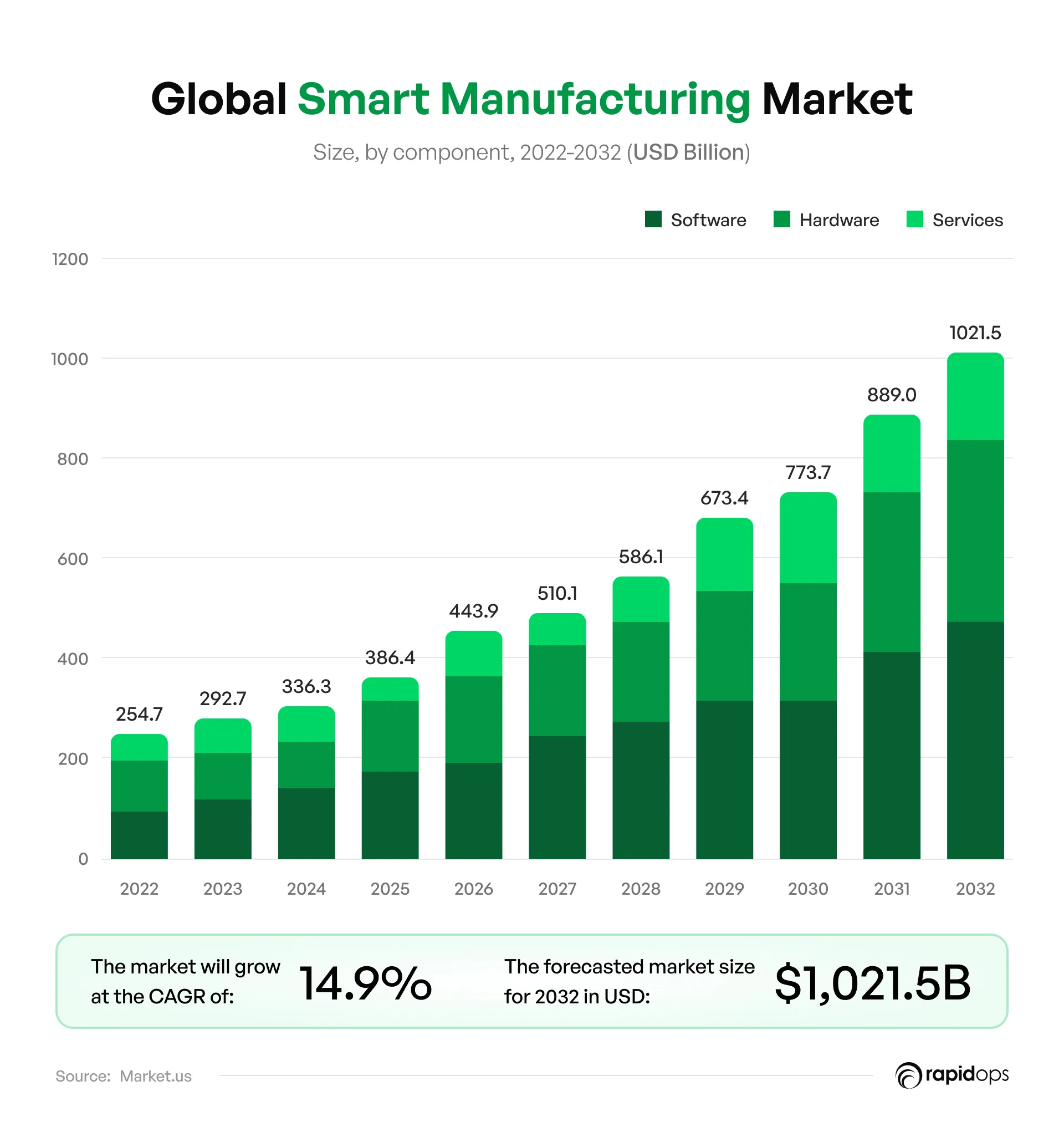
What is digital transformation in manufacturing?
The way manufacturers operate is undergoing a fundamental shift. It’s no longer just about digitizing isolated processes or upgrading legacy equipment. The true value lies in rethinking how businesses create, deliver, and scale outcomes across every function. This is the foundation of digital transformation in manufacturing.
By embedding technologies like AI in manufacturing, IoT, automation, and advanced data analytics into daily operations, companies can evolve beyond incremental improvements. These capabilities drive smarter systems, faster decision-making, and deeper visibility, from production lines to supply chains.
Yet the digital transformation of manufacturing isn’t just a tech project, it’s a strategic evolution. It aligns people, processes, and technologies to unlock continuous innovation, resilience, and long-term competitiveness. For manufacturers operating in volatile markets, this transformation enables them to break down silos, respond to disruptions with agility, and lead in a more complex global landscape.
How digital transformation helps manufacturers
Streamline complex operations
Digitally connected systems break down silos, integrating data, tools, and workflows across departments, simplifying decisions and eliminating operational blind spots.
Accelerate insight-to-action cycles
Real-time data from machines, sensors, and ERP platforms enables teams to spot issues early and act immediately turning potential downtime into productivity.
Enhance supply chain intelligence
With IoT in manufacturing, companies gain real-time visibility into suppliers, logistics, and inventory, allowing faster responses and better planning across the entire value chain.
Adapt production to market signals
AI-powered forecasting and automation in manufacturing allow businesses to dynamically align production with demand, resources, and external changes.
Modernize legacy ecosystems
Manufacturing digital transformation bridges outdated systems with modern digital solutions, extending functionality, enabling interoperability, and laying the groundwork for scalable growth.
Key drivers of digital transformation in manufacturing
Manufacturers today face rising costs, shifting customer demands, and constant supply chain disruptions. Digital transformation in manufacturing offers a practical way to modernize operations, align with market needs, and drive growth. Through connected systems and data-driven decisions, manufacturing digital transformation is reshaping how value is delivered, faster, smarter, and more sustainably.
1. Customers are redefining value and demanding more of it
Modern buyers aren’t just looking for quality, they expect speed, personalization, and sustainability as standard. To meet these rising expectations, manufacturers are turning to digital transformation for manufacturing that puts the customer at the center.
- Speed with intelligence: AI and IoT in manufacturing help reduce lead times and enable proactive operations that anticipate demand before it peaks.
- Scalable personalization: Through data-driven manufacturing, businesses can deliver mass customization at scale—offering tailored products while maintaining efficiency.
- Sustainable operations: With 73% of consumers prioritizing sustainability, customer-centric manufacturing now includes eco-friendly practices powered by intelligent systems that minimize waste and energy usage.
2. Regulations are rising, and smart compliance builds competitive advantage
Compliance is no longer just a box to tick, it’s an opportunity to lead. As governments tighten environmental and ethical standards, forward-thinking manufacturers are embracing digitalization in manufacturing to gain visibility, reduce risk, and demonstrate leadership.
- Emission and waste reduction: Smart sensors and AI in manufacturing help cut emissions and optimize energy use, aligning with global standards and reducing operational costs.
- Traceability and transparency: Blockchain and smart manufacturing systems ensure end-to-end visibility, building trust with regulators and customers alike.
3. Innovation and efficiency are converging, not conflicting
Innovation used to be expensive. Now, it drives cost savings. Through the lens of manufacturing industry digital transformation, innovation has become a catalyst for efficiency and resilience. With the right digital foundation, manufacturers can accelerate product development, streamline operations, and respond faster to shifting market demands, while significantly improving margins.
- Accelerated development: AI and generative design tools unlock faster prototyping and market entry.
- Operational excellence: With predictive maintenance in manufacturing, companies prevent downtime, extend asset life, and reduce maintenance costs—all key outcomes of digital transformation manufacturing.
4. Resilience now depends on agility and visibility
The last few years have made one thing clear: supply chains must be smarter. Disruptions are the new normal, but manufacturers that embrace the digital transformation of manufacturing are building the agility needed to respond, not react.
- Live decision-making: Embedded IoT in manufacturing and blockchain provide real-time insights across the supply chain, enabling rapid, informed action and supply chain optimization.
- Flexible operations: Automation empowers businesses to quickly adapt production lines, rebalance resources, and maintain output, even under pressure.
What this means for your business
Manufacturers today face a clear choice: adapt or risk falling behind. The digital shift in manufacturing isn’t just a trend, it’s a fundamental transformation that realigns operations, people, and technology to compete and thrive in the new industrial era.
Start with a clear understanding of your priorities. Look for opportunities where manufacturing digital transformation can drive the most impact. And build a roadmap that balances short-term wins with long-term scalability.
The future is being built now, and the manufacturers leading that future are the ones who embrace the shift today.
The benefits of digital transformation in manufacturing
In the age of hyper-connectivity and shifting market demands, digital transformation in manufacturing has become a strategic imperative, not a choice. This ongoing digital shift in manufacturing is more than a tech upgrade; it's a rethinking of how factories operate, innovate, and grow.
Through manufacturing digital transformation, companies are streamlining production, building resilience, and delivering smarter, faster, and more sustainable value to customers worldwide.
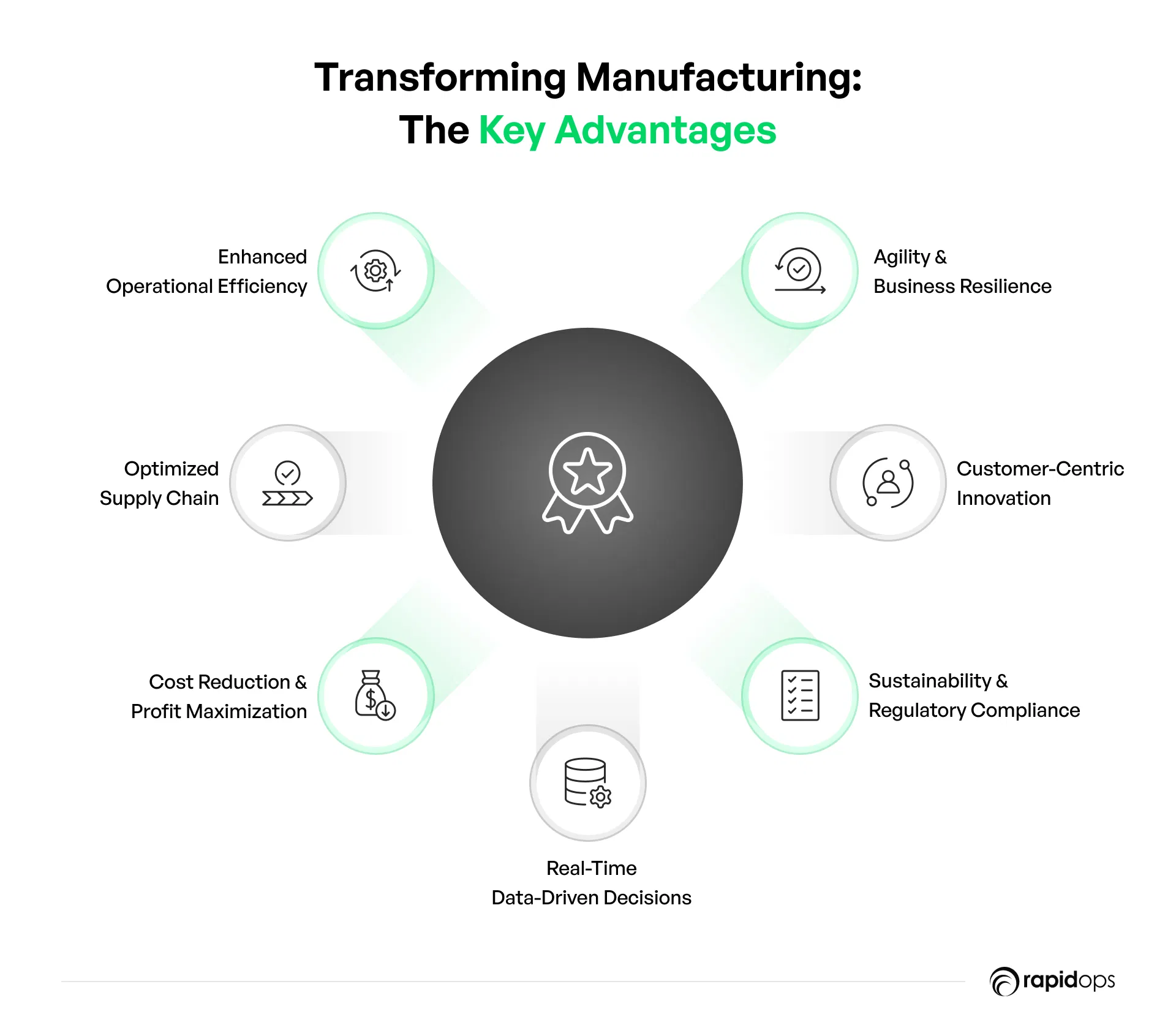
1. Enhanced operational efficiency through intelligent automation
One of the most tangible benefits of digital transformation in manufacturing is the significant improvement in operational efficiency. With the adoption of smart manufacturing practices, manufacturers use AI in manufacturing and IoT in manufacturing to enable real-time monitoring across production lines. This allows teams to identify inefficiencies, predict failures, and correct issues before they lead to costly disruptions.
Manufacturing process automation further enhances throughput by eliminating manual errors and speeding up repetitive tasks. These technologies work in tandem to reduce downtime, cut operational costs, and boost productivity. The result is a more efficient, responsive, and profitable operation.
2. Increased agility in a fast-moving environment
Agile manufacturing is essential for organizations facing unpredictable market shifts and fluctuating demand. Digital transformation for manufacturers introduces real-time analytics in manufacturing, allowing companies to adapt production schedules, manage inventory dynamically, and respond to customer changes quickly.
Responsive manufacturing operations help avoid stockouts and overproduction, ensuring manufacturers can keep pace with changing conditions. The ability to pivot at speed provides a critical edge in volatile markets, turning agility into a competitive advantage.
3. Data-driven insights for smarter, faster decisions
Data-driven manufacturing transforms how decisions are made on the shop floor and in the boardroom. With advanced manufacturing analytics solutions and predictive analytics in manufacturing, leaders gain full visibility into production performance, machine health, and resource utilization.
Rather than relying on assumptions, digital transformation in manufacturing equips teams with the evidence they need to make proactive, strategic decisions. These insights not only enhance operational performance but also support long-term planning and risk mitigation.
4. Accelerating product innovation and development cycles
Speed-to-market is a vital differentiator in modern manufacturing. With product innovation with AI and generative design in manufacturing, companies can accelerate R&D processes and bring new offerings to market faster than ever.
By leveraging faster time-to-market strategies enabled by digital tools, manufacturers are now able to test, iterate, and refine products with greater precision. These capabilities foster a culture of continuous innovation, helping businesses seize new opportunities, respond to trends, and gain a first-mover advantage.
5. Driving sustainability and long-term profitability
Sustainable manufacturing is not just good for the planet, it's good for business. The impact of digital transformation in manufacturing extends to green manufacturing practices by enabling better resource optimization and energy-efficient manufacturing.
IoT sensors track energy usage and waste in real-time, while AI optimization tools help fine-tune operations to reduce environmental impact. This proactive approach ensures compliance with regulations and aligns with growing consumer demand for ethical and sustainable products. Ultimately, it creates a strong foundation for long-term profitability and brand trust.
6. Strengthened supply chain resilience and visibility
In today’s interconnected world, resilient manufacturing supply chains are critical. The digital transformation of manufacturing empowers organizations to strengthen their supply chains through advanced supply chain optimization strategies.
IoT in manufacturing and blockchain in manufacturing offer unprecedented visibility into supplier performance, inventory levels, and delivery timelines. By anticipating disruptions and enabling rapid response, businesses can ensure continuity and reduce the risk of costly interruptions.
7. Elevating the customer experience and brand loyalty
Customer expectations are evolving rapidly, and manufacturers must keep up. Digital transformation in manufacturing supports personalized manufacturing, allowing brands to tailor products and services at scale.
By embracing customer-centric manufacturing approaches and leveraging custom product manufacturing capabilities, businesses can deliver faster, more responsive service. AI-driven analytics reveal buyer preferences, while automation ensures timely delivery. Sustainability initiatives also enhance the brand's reputation among eco-conscious consumers.
This results in stronger customer relationships, higher satisfaction, and long-term loyalty.
Core technologies powering digital transformation in manufacturing
Digital transformation in manufacturing is reshaping the industry by harnessing smart manufacturing technologies to unlock efficiency, agility, and innovation.
As the fourth industrial revolution accelerates, manufacturers must leverage Industry 4.0 technologies, like AI, IoT, automation, and cloud computing, to remain competitive and scalable. This section explores how core technologies drive manufacturing digitalization and highlights their real-world impact on operations, growth, and sustainability.
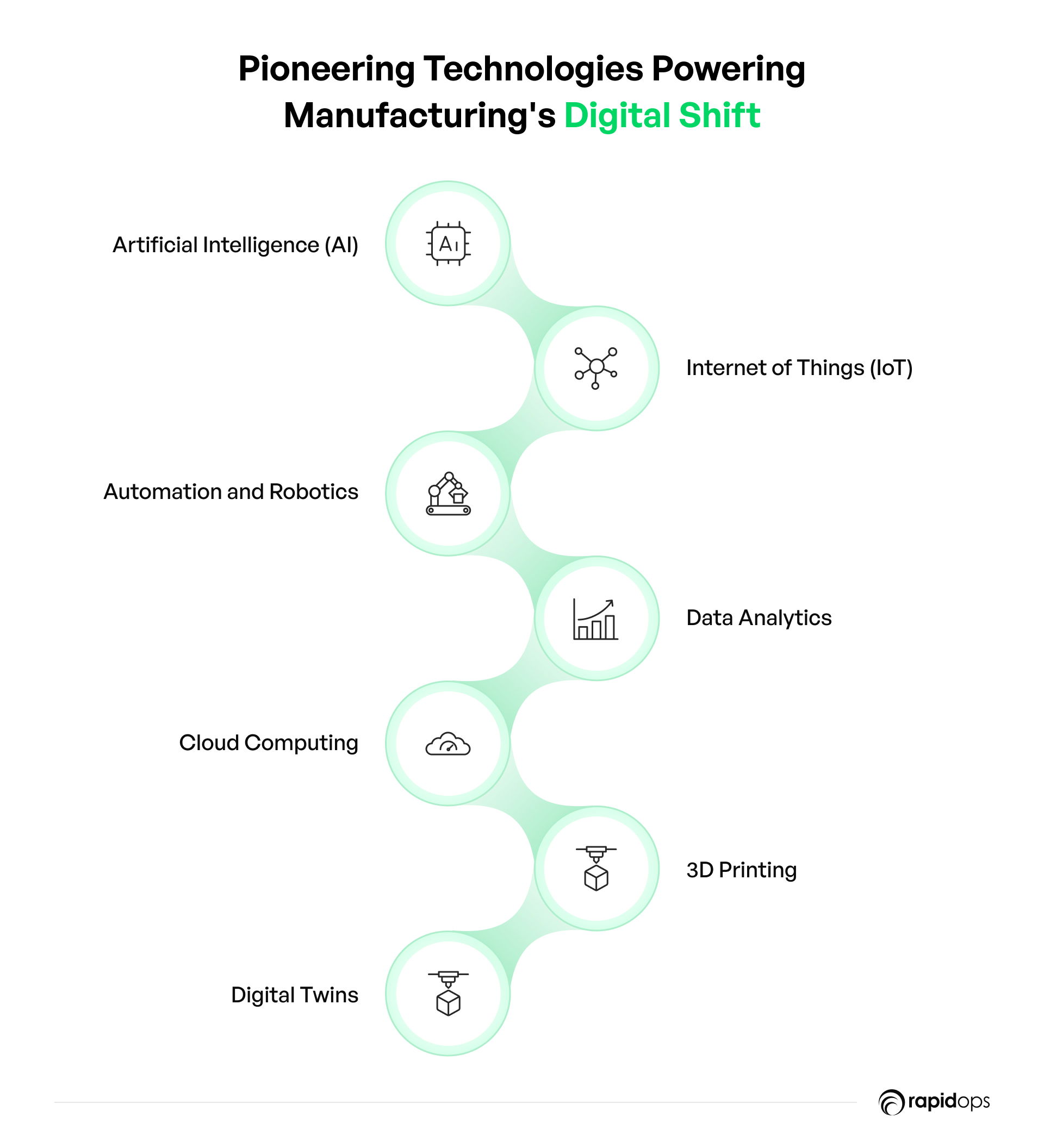
AI in manufacturing: Smarter decisions, better outcomes
Artificial Intelligence is central to manufacturing innovation through technology. By analyzing massive datasets and enabling predictive intelligence, AI in manufacturing empowers leaders to anticipate problems, reduce downtime, and adapt to shifting demands.
What it does
AI algorithms transform production data into actionable insights, enhancing decision-making across every layer of the manufacturing value chain.
How it helps
- Predictive maintenance with AI: Machine learning for predictive maintenance reduces unplanned downtime and extends asset lifespan.
- Quality control: AI-powered computer vision identifies defects in real time, reducing waste and improving consistency.
- Demand forecasting: By analyzing customer and market data, AI aligns output with real-world demand.
Impact
AI drives manufacturing process optimization, ensuring agility, improving margins, and enabling future-ready factories.
IoT in manufacturing: Enabling connected factory solutions
The role of IoT in smart manufacturing is to enable real-time data exchange across connected systems, creating a foundation for intelligent automation and remote visibility.
What it does
Smart sensors in manufacturing capture real-time operational insights across equipment, materials, and energy usage.
How it helps
Remote monitoring manufacturing systems: Sensors and devices provide 24/7 visibility into asset health.
Supply chain transparency: Track raw materials and finished goods throughout the supply chain.
Energy optimization: IoT-enabled systems reduce power consumption, supporting sustainability in digital manufacturing.
Impact
IoT technologies power smart factory solutions that optimize operations, reduce costs, and improve traceability from the shop floor to the supply chain.
Automation in manufacturing: Driving efficiency and scale
From robotics in factory automation to fully integrated systems, automation in manufacturing plays a critical role in improving throughput and reducing human error.
What it does
Automated systems take over repetitive and complex tasks, ensuring speed, precision, and consistency.
How it helps
- Examples of automation in the manufacturing industry: Robotic arms on assembly lines and automated material handling systems reduce cycle times.
- Cost optimization: Reduces labor costs and increases production uptime.
- Advanced manufacturing technologies: Enable complex part manufacturing with minimal human intervention.
Impact
Automation scales operations and supports agile manufacturing strategies for faster, more flexible production cycles.
Data analytics for manufacturers: Turning big data into smart insights
Big data and analytics fuel digital transformation in manufacturing by converting raw data into actionable knowledge.
What it does
Data analytics uncovers inefficiencies, identifies trends, and informs strategic decisions across operations and customer engagement.
How it helps
- Real-time operational insights: Dashboards visualize performance, helping teams act on bottlenecks instantly.
- Customer intelligence: Understand market behavior to align product strategies.
- Process optimization: Identify and eliminate inefficiencies to improve throughput.
Impact
By harnessing data analytics, manufacturers can fine-tune every process, reduce waste, and future-proof decision-making.
Cloud computing in manufacturing: Building flexible, scalable infrastructure
Cloud computing in manufacturing enables global collaboration, central data access, and operational scalability without the burden of physical infrastructure.
What it does
Stores software, data, and systems in cloud environments, enabling seamless integration across teams and geographies.
How it helps
- Cloud-based solutions for manufacturing companies: Accelerate deployment, reduce maintenance, and lower total cost of ownership.
- Remote accessibility: Manage multiple facilities and suppliers from any location.
- Scalable digital solutions for manufacturing growth: Easily scale up capacity or capabilities as needed.
Impact
Cloud platforms enhance business continuity, support global growth, and power agile manufacturing operations.
3D printing in manufacturing: Innovation through agility
Also known as additive manufacturing, 3D printing in manufacturing enables faster prototyping, customization, and reduced material waste.
What it does
Builds physical objects from digital blueprints, layer by layer, supporting low-volume, high-complexity production.
How it helps
- How 3D printing improves manufacturing efficiency: Accelerates R&D cycles and reduces tooling costs.
- Custom manufacturing solutions: Create personalized products without retooling.
- Sustainability: Minimizes scrap material and energy usage.
Impact
3D printing supports agile product development and gives manufacturers a competitive edge with rapid customization.
Digital twin technology manufacturing: Simulate, predict, and optimize
Digital twin technology in manufacturing provides a real-time virtual replica of physical systems, allowing for simulation and performance optimization.
What it does
Combines IoT, AI, and analytics to create living digital models of machines, processes, and systems.
How it helps
- Impact of digital twins on manufacturing performance: Simulate changes, predict failures, and improve planning.
- Operational optimization: Reduce downtime and resource usage through continuous monitoring.
- Real-time manufacturing data: Visualize live metrics to enhance responsiveness.
Impact
Digital twins bridge physical and digital environments, enabling smarter, more sustainable operations and long-term competitiveness.
Turning transformation into a competitive advantage
Digital transformation in manufacturing isn’t just about technology—it’s about outcomes. From predictive maintenance with AI to connected factory solutions and cloud-based systems, the integration of smart manufacturing technologies unlocks scalable, sustainable, and future-proof growth.
Whether you're optimizing manufacturing processes, improving supply chain transparency, or adopting Industry 4.0 technologies, now is the time to act. Embrace manufacturing digitalization to unlock smarter decisions, better outcomes, and long-term competitive advantage.
Challenges of digital transformation in manufacturing
Digital transformation in manufacturing is more than adopting technology, it’s about driving smart manufacturing, boosting innovation, and redefining competitiveness in the age of Industry 4.0. But unlocking its potential requires overcoming persistent and complex barriers. Here's what’s standing in the way, and how forward-thinking manufacturers can address them head-on.
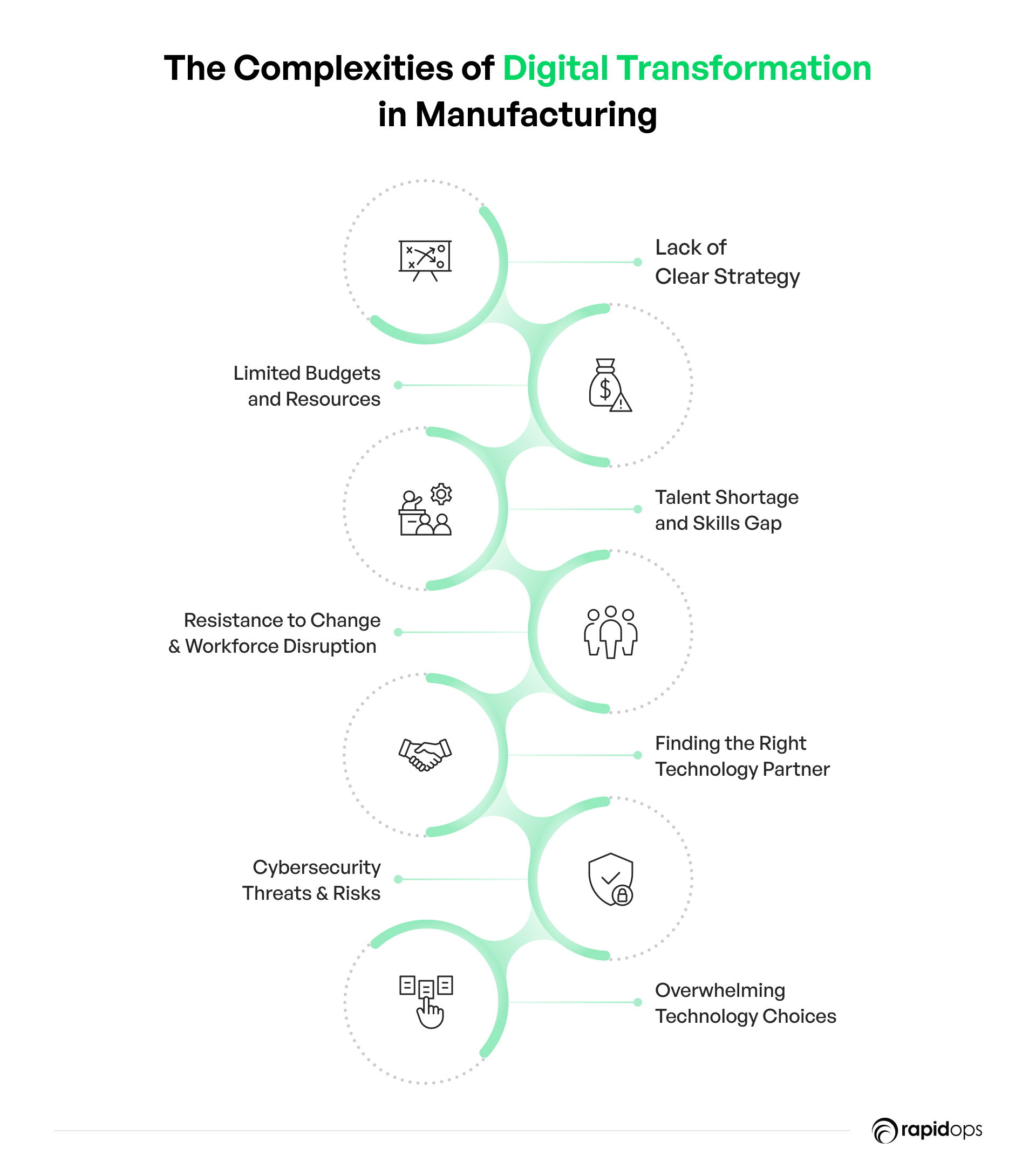
1. Lack of a strategic manufacturing transformation roadmap
Many companies begin their digital journey without a clear manufacturing strategy for digital transformation. Without alignment between digital initiatives and core business goals, efforts often result in fragmented projects and poor ROI.
This strategic disconnect hampers operational efficiency, slows innovation, and delays competitiveness. A defined transformation roadmap for manufacturers is essential to guide investments and ensure business-aligned outcomes.
2. Budget constraints and resource limitations
Budget constraints in manufacturing remain a top concern. A Deloitte study found that over 52% of manufacturers cite funding as a key barrier to digital transformation.
Manufacturing technology investment often requires upfront costs in digital tools, infrastructure, and workforce development, investments many hesitate to make under tight margins. Overcoming resource constraints in manufacturing transformation demands prioritizing high-impact, scalable solutions with clear ROI.
3. Skills gap and talent shortages
The impact of the digital skills gap on smart manufacturing is significant. Emerging technologies like IoT, AI, and automation require specialized skills. Yet, 43% of manufacturers report difficulty finding talent with the right digital capabilities.
The talent shortage in manufacturing limits technology adoption and stifles innovation. Upskilling the manufacturing workforce and investing in long-term talent development are critical for sustainable transformation.
4. Workforce resistance to change and cultural misalignment
Why manufacturers resist digital change often stems from fear, of job loss, unfamiliar systems, or cultural disruption. Workforce resistance to change is a major challenge, affecting 63% of manufacturers during transformation.
Managing cultural resistance during manufacturing transformation requires clear communication, strong leadership, and robust manufacturing change management strategies that support rather than displace existing teams.
5. Selecting the right technology partner
Choosing the right technology partner for manufacturing can make or break your transformation. Yet, 38% of manufacturers face vendor selection issues, resulting in misaligned solutions, underperforming systems, and reduced ROI.
Selecting technology partners in manufacturing should focus on long-term value, industry alignment, and seamless integration. Trusted partners simplify complexity and accelerate transformation.
6. Navigating a complex technology landscape
From AI to robotics, manufacturers are overwhelmed by the rapid pace of digital innovation. Technology adoption in manufacturing becomes a challenge when companies are unclear on which tools fit their needs.
PwC reports that 58% of manufacturers struggle to evaluate options effectively. Avoiding common mistakes in manufacturing digital strategy involves aligning business goals with digital initiatives in manufacturing to ensure smart, scalable choices.
Turning challenges into opportunities
Overcoming these challenges requires a strategic approach anchored in clear business objectives. By focusing on high-impact initiatives, investing in workforce development, and collaborating with technology partners offering tailored, scalable solutions, manufacturers can fully leverage digital transformation in manufacturing to drive long-term success.
Real-world case studies: Successful digital transformation
Case Study 1: GE Appliances – Enhancing operational efficiency
GE Appliances faced a major operational overhaul to stay competitive in a fast-changing market. Their strategy involved embracing modern technologies to streamline processes, enhance decision-making, and boost overall efficiency. By integrating IoT, AI, and automation, they were able to significantly improve productivity, reduce costs, and optimize resource management. This case study illustrates how taking a proactive approach to digital transformation helped GE Appliances achieve measurable results and strengthen their position in the industry.
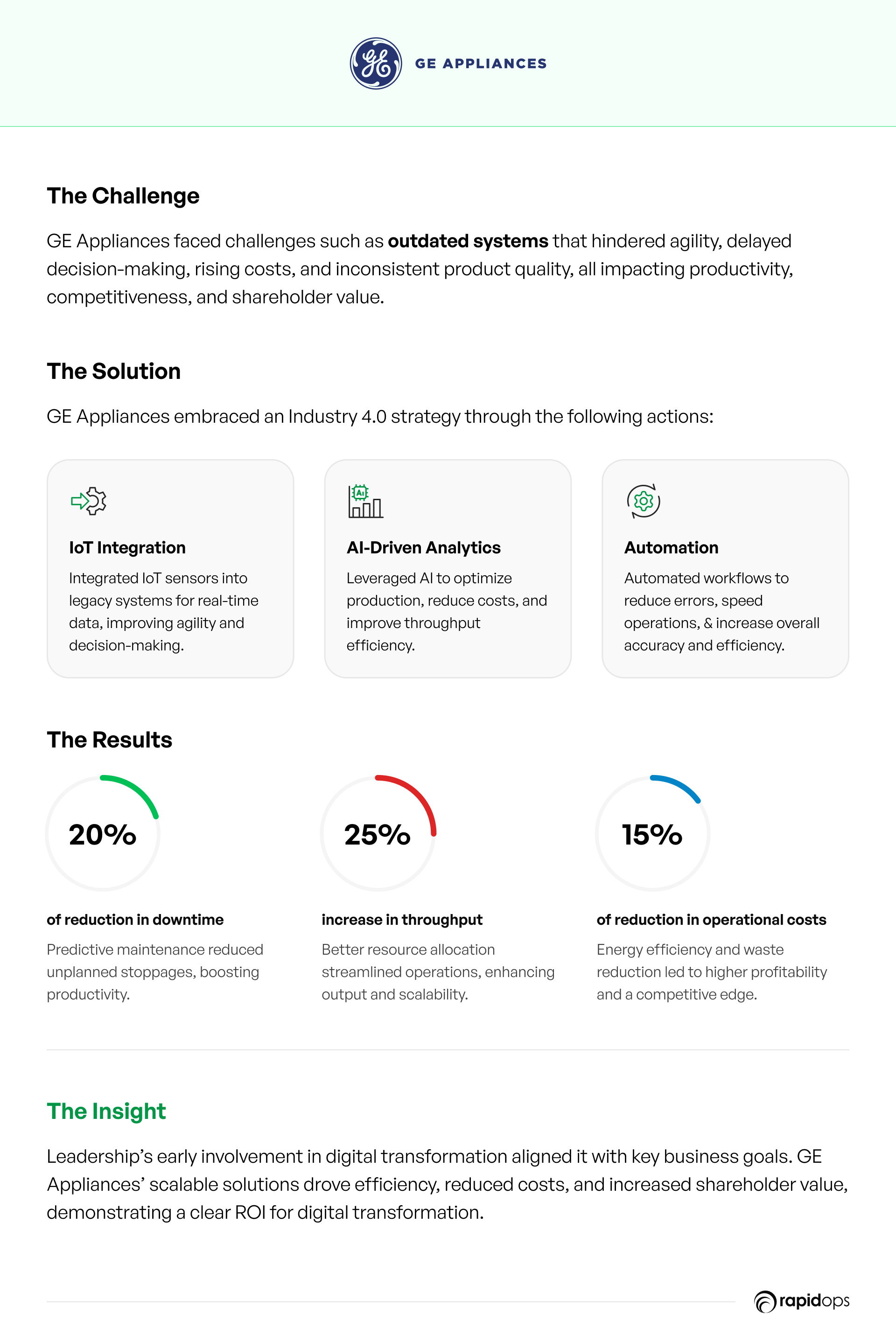
Case Study 2: Caterpillar Inc. – AI and data-driven excellence
Caterpillar Inc. faced rising maintenance costs and inefficiencies due to outdated systems, which were limiting their ability to scale and maintain profitability. To address this, they strategically adopted advanced technologies, such as AI and IoT, to modernize their equipment management processes. This case study demonstrates how innovations helped Caterpillar improve efficiency, reduce downtime, and cut costs, boosting their competitive edge and ensuring sustainable growth in a challenging market.
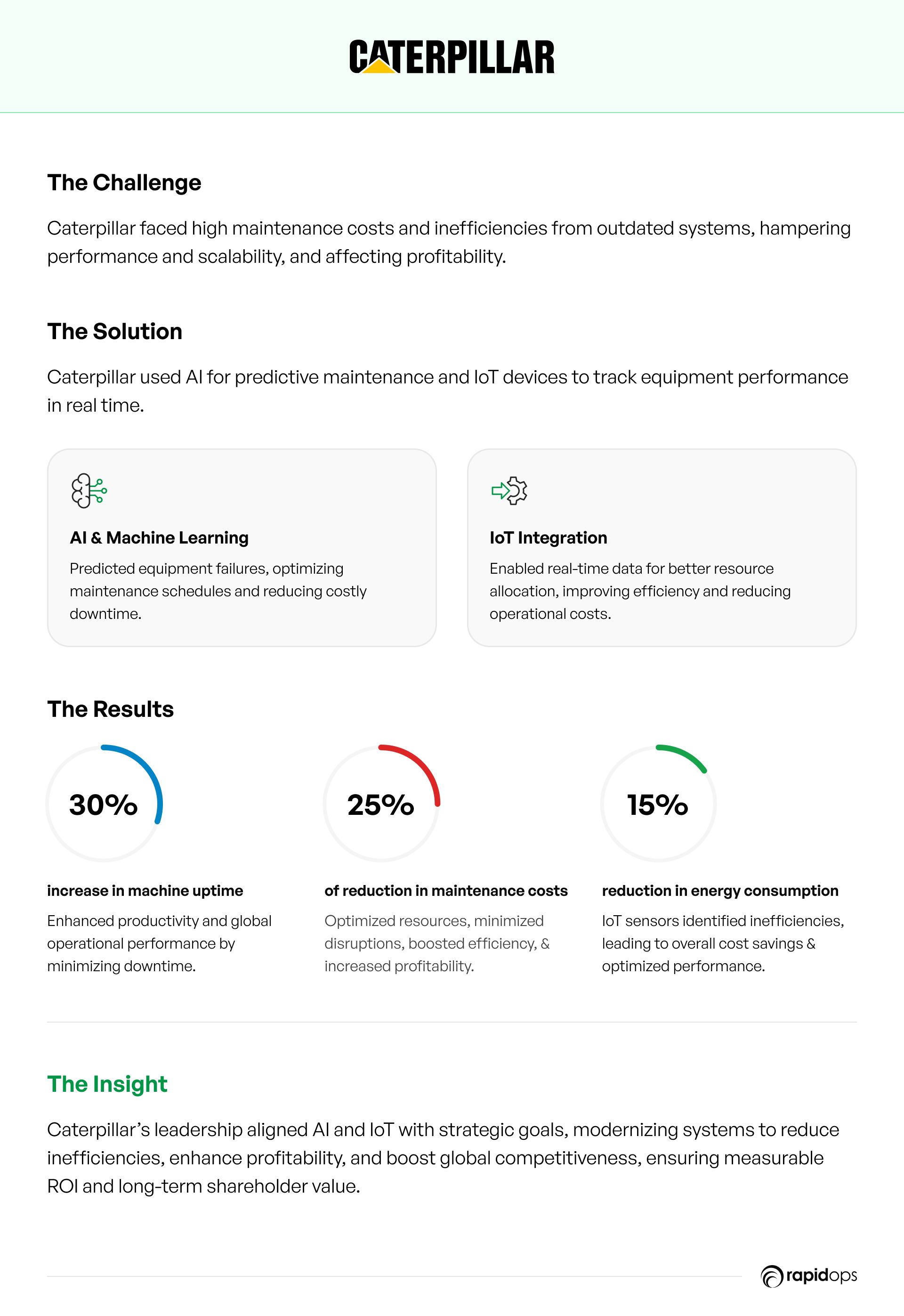
Manufacturing’s transformation: Leading with innovation and resilience
Manufacturing stands at a pivotal crossroads, where digital transformation has shifted from a strategic advantage to a critical necessity.
With AI, IoT, and automation reshaping the landscape, manufacturers now have the opportunity to enhance operational efficiency, strengthen resilience, and navigate challenges like supply chain disruptions, labor shortages, and evolving market demands. These technologies are the foundation for future-proofing operations, enabling greater agility, and driving sustainable growth.
At Rapidops, we understand the unique pressures and priorities of decision-makers like you. With over 15 years of experience, we specialize in modernizing legacy systems, dismantling operational silos, and unlocking the full potential of Industry 4.0. Our solutions are tailored to meet your organization’s specific needs, empowering data-driven decisions and enhancing operational excellence.
Take the first step toward transformative growth. Partner with us to assess your current systems, pinpoint inefficiencies, and create a clear strategy tailored to your goals. Together, we’ll future proof your manufacturing operations for resilience, agility, and a lasting competitive edge. Schedule your strategy call now and start turning your vision into reality.
Frequently Asked Questions
How do you calculate the ROI of digital transformation in manufacturing?
What are the financial pitfalls of digital transformation, and how can they be avoided?
How can leaders ensure digital transformation aligns with changing customer demands?
How can leaders foster innovation while mitigating risks in digital transformation?
How can manufacturers future-proof their digital transformation investments?
How do you choose between in-house implementation and outsourcing for digital transformation projects?
What’s Inside
- What is digital transformation in manufacturing?
- Key drivers of digital transformation in manufacturing
- The benefits of digital transformation in manufacturing
- Core technologies powering digital transformation in manufacturing
- Challenges of digital transformation in manufacturing
- Real-world case studies: Successful digital transformation
- Manufacturing’s transformation: Leading with innovation and resilience




